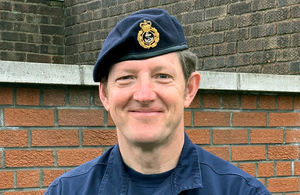Reservist diver on life under the sea
A naval reservist has revealed what life is really like for a clearance diver on submarine emergencies with the Royal Naval Reserve (RNR).

Chief Petty Officer Chris Betts. Copyright LO RFCA
Chief Petty Officer (CPO) Chris Betts is a member of the Reserve Diving Group (RDG) after completing a full career as a Royal Navy clearance diver before joining the Maritime Reserve with HMS Dalriada, based in Glasgow.
Traditionally a clearance diver was a specialist naval diver who would use explosives underwater to remove mines and other obstructions, allowing harbours and shipping channels to safely navigate. However, the role has changed over the years to include other naval underwater work.
Thirty-five years after leaving Loughborough, the now Oban-local continues to enjoy life under the sea as a reservist since leaving his full-time post in the navy in 2018.
CPO Betts is now part of an exclusive team, the High Readiness Reserve (HRR). He is one of 12 Royal Naval Reserve (RNR) personnel committed to 72 hours notice to be deployed on submarine emergencies anywhere in the world.
The HRR delivers a unique role in support of the NATO Submarine Rescue System (NSRS), based out of HMNB Clyde. CPO Betts is also one of only a handful of Regular and Reserve Diving Supervisors trained to manage and supervise therapeutic decompression of rescued submariners using the NSRS Transfer Under Pressure system.
He said:
Twelve RNR divers are currently engaged in HRR at 72 hours notice to move for NSRS along with other UK and foreign divers, doctors, and nurses from France and Norway. This system provides a submarine rescue capability for the three nations that run the system.
It has the capacity of being flown anywhere globally to a capable seagoing platform. We can also, at request, help any country that has the misfortune to lose a submarine at sea, aiding the rescue of men lost at sea.
We operate for the Fleet Diving Squadron, and the role we supply to them is EOR (Explosive Ordnance Reconnaissance). Having several Ex-Surviving CD supervisors allows us to conduct searching for jetties and piers in harbours – anywhere a naval asset might come alongside – and we can be asked to search the jetty as Reservists.
If anything is found, we make it and call in the full-time RN CD. Although this was my job in the Navy, we come away from the search, helping where needed. You can also be called upon to support the area Bomb disposal team in Portsmouth, Plymouth and Faslane when needed, working alongside the Regulars.
CPO Betts joined the Royal Navy as a Missileman in 1986 before conducting divers aptitude and then becoming a ships diver. He was then recommended for clearance diver and subsequently transferred branch to Horsea Island. After spending many years as a regular in the Royal Navy, CPO Betts has been impressed by what he has seen from his part-time colleagues who he sees as really great friends.
He explained:
There have only been about 2,500 qualified Clearance Divers that have passed through Horsea Island since the branch started in 1952. One of the most demanding courses in the RN, 15 started on our course, and only four of us passed. So we are quite an exclusive club.
Obviously, it’s a specialised niche. I spent a lot of time being trained as a diver in the RN with high standards, and now I spend my time training the RNR Divers. Ex CD’s have a unique insight into how the Regulars work, but I was very surprised by how high the standard was of the RNR divers when I first started. They are very keen, fit and able, and bring many unique civilian skills to the diving branch.
I have discovered just how valuable RNR is to the RN, and I am extremely proud to be a part of it. But, of course, this is true about all of the trades within the RNR.
When CPO Betts is not traveling the world as a reservist he works as a chamber manager for the emergency recompression facility for the NHS west coast of Scotland at Tritonia Scientific Ltd.
The company is a diving and underwater research company offering specialist diving services in support of a range of commercial and advanced scientific operations, specialising in photogrammetric 3D digital modelling.
He hailed the support from his civilian employer, which allows him to carry out his reservist duties.
He said:
My HRR and NSRS duties are always emergency responses. You’re not getting called out for training. We are getting called out to help save lives.
If a submarine malfunctions and is sitting on the seabed, I’m sure any employer is more than happy for us to go and spend two or three weeks away helping.
Companies get financial help from the RNR to bring someone in to fill our space for a support role or equivalent civilian from another outside agency. There are thousands of employees and companies out there who help the personnel of the RNR.
Ends